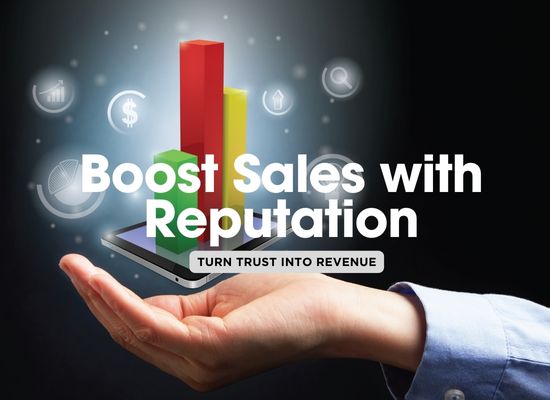In today’s competitive market, a stellar reputation isn’t just a nice-to-have; it’s a must-have for driving sales and business growth. Reputation management goes far beyond damage control—it’s about building trust, increasing visibility, and creating lasting connections with your target audience. When done right, reputation management becomes a powerful sales engine, seamlessly integrated into your broader marketing strategy to attract new customers, retain loyal ones, and boost overall revenue.
Expanding Sales with Reputation Management: A Guide to Unlocking Growth
In today’s competitive market, a stellar reputation isn’t just a nice-to-have; it’s a must-have for driving sales and business growth. Reputation management goes far beyond damage control—it’s about building trust, increasing visibility, and creating lasting connections with your target audience. When done right, reputation management becomes a powerful sales engine, seamlessly integrated into your broader marketing strategy to attract new customers, retain loyal ones, and boost overall revenue.
1️⃣ Harness the Power of Positive Reviews
Why it works:
Positive reviews build credibility and act as social proof, influencing potential customers to choose your brand over competitors.
How to do it:
- Actively request reviews from satisfied customers through automated follow-ups or personalized outreach.
- Display testimonials prominently on your website, product pages, and social media platforms.
- Use review insights to highlight strengths in your sales pitches.
Pro tip: Incentivize reviews with discounts or loyalty points, but always comply with local regulations to maintain authenticity.
2️⃣ Optimize for Reputation-Driven SEO
Why it works:
Search engines reward brands with strong reputations, increasing your online visibility where it matters most.
How to do it:
- Publish high-quality content showcasing expertise and customer success stories.
- Respond to reviews—positive or negative—to demonstrate customer engagement.
- Build backlinks from reputable sites in your industry to strengthen credibility.
Pro tip: Create an FAQ page addressing common concerns found in reviews to improve SEO and customer satisfaction simultaneously.
3️⃣ Transform Negative Feedback into Opportunities
Why it works:
Handling criticism effectively builds trust and shows customers that you value their input.
How to do it:
- Respond to negative reviews promptly and professionally.
- Offer solutions publicly and follow up privately to resolve issues.
- Use recurring feedback themes to identify areas for improvement in products or services.
Pro tip: Showcase resolved issues as “success stories” to highlight your commitment to customer satisfaction.
4️⃣ Leverage Social Media for Reputation Amplification
Why it works:
Social media provides a platform to engage directly with your audience and amplify your brand’s positive image.
How to do it:
- Share positive reviews and testimonials in visually engaging posts.
- Highlight customer milestones or shoutouts to foster community loyalty.
- Use social listening tools to monitor and address brand mentions in real time.
Pro tip: Create a dedicated hashtag for customer reviews or feedback to encourage organic sharing.
5️⃣ Build Strategic Partnerships to Enhance Credibility
Why it works:
Collaborating with trusted organizations or influencers can strengthen your reputation and expand your reach.
How to do it:
- Partner with industry influencers to endorse your brand authentically.
- Collaborate with complementary businesses for co-branded campaigns or events.
- Highlight these partnerships on your website and marketing materials to build trust.
Pro tip: Showcase endorsements or certifications prominently on your website for added credibility.
6️⃣ Showcase Expertise with Thought Leadership Content
Why it works:
Positioning your brand as a thought leader establishes trust and authority, driving high-quality leads and repeat customers.
How to do it:
- Publish blogs, whitepapers, and guides that address key pain points in your industry.
- Host webinars or join industry panels to showcase your expertise.
- Share content on platforms like LinkedIn to reach a professional audience.
Pro tip: Use client testimonials or case studies in your content to provide real-world proof of your expertise.
7️⃣ Create a Reputation-Driven Referral Program
Why it works:
Satisfied customers are your best advocates. A referral program incentivizes them to spread the word and brings in warm leads with a high conversion potential.
How to do it:
- Offer discounts, free products, or exclusive perks for successful referrals.
- Create an easy-to-use platform where customers can track their referrals.
- Combine referral incentives with positive review campaigns for maximum impact.
Pro tip: Highlight top referrers publicly to encourage friendly competition and engagement.
8️⃣ Monitor and Respond to Brand Mentions Proactively
Why it works:
Staying ahead of conversations about your brand allows you to influence narratives and build stronger connections with customers.
How to do it:
- Use tools like Google Alerts or social listening platforms to track brand mentions across the web.
- Respond to mentions—both positive and negative—with authenticity and professionalism.
- Thank customers who speak highly of your brand to foster goodwill.
Pro tip: Turn positive mentions into shareable content, like quotes or testimonials, to amplify your reach.
9️⃣ Develop Industry-Specific Portals for Reputation Building
Why it works:
Creating online hubs tailored to your industry elevates your reputation and drives engagement with a targeted audience.
How to do it:
- Build resource centers, directories, or forums where industry professionals can interact.
- Include customer success stories, testimonials, and educational content.
- Use these portals to showcase your products or services as key solutions for industry challenges.
Pro tip: Monetize these portals with advertising, subscriptions, or premium content while reinforcing your brand’s credibility.
🔟 Integrate Reputation Management into Paid Advertising
Why it works:
Highlighting your strong reputation in paid campaigns drives higher click-through and conversion rates.
How to do it:
- Include testimonials, ratings, or awards in your ad copy and visuals.
- Target audiences with remarketing ads featuring positive customer feedback.
- Use geo-targeting to highlight local reviews in location-specific campaigns.
Pro tip: Test different reputation-focused ad angles, like customer success stories or trust-building statistics, to see what resonates best.
These next-level strategies take reputation management from reactive to proactive, building a foundation for continuous sales growth and lasting success. Combined with the first five steps, you now have a comprehensive roadmap to expand sales while elevating your brand’s image. Stay ahead of the competition by making reputation your greatest asset! 🌟



